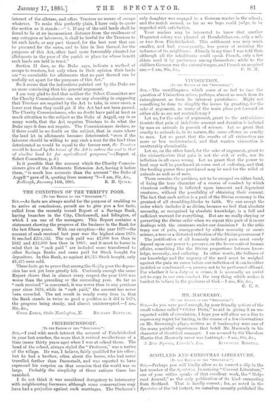VIVI S ECT1ON.
I To THE EDITOR OF THE "SrEcTATon.-;
Stn,—The unwillingness which some of us feel to face the question of Vivisection arises, perhaps, almost as much from its entanglement as from its inherent painfulness. Might not something be done to simplify the issues by granting, for the sake of argument, as ninny of the main pleas put forward on either side as are not contradictory ?
Let us, for the sake of argument, grant to the anti-vivisectionists that pain of indefinite amount and duration is inflicted by man on animals in pursuit of science. Let us grant that cruelty to animals is, in its nature, the same offence as cruelty to man. Let us grant that the results of all vivisection are more or less undetermined, and that wanton vivisection is unutterably abominable.
Let us, on the other hand, for the sake of argument, grant to the vivisectionists that pain is not the evil of evils, nor its infliction in all cases wrong. Let us grant that the power to heal may well be purchased at some cost of suffering, and that the healing power thus purchased may be used for the relief of animals as well as of men.
There remains the problem, not to be escaped on either hand, of fixing the true character of a course of conduct by which vicarious suffering is inflicted upon innocent and dependent creatures, without the possibility of obtaining their consent. The fact that such action is a part of the Divine economy is the greatest of all stumbling-blocks to faith. We can accept the order which includes it as divine, because we feel that absolute necessity, as recognised by absolute knowledge, is a full and sufficient warrant for everything. But are we really obeying or perverting the divine order when we repeat this part of it in our dealings with the creatures under our dominion Is the arbitrary use of pain, unsupported by either necessity or omniscience, a true or a distorted reflection of the Divine government ?
The justification of all humanly inflicted pain must surely depend upon our power to preserve, on the lesser scale of human affairs, something like the Divine proportions between knowledge, necessity, and suffering. In other words, the fullness of our knowledge and the urgency of the need must be weighed against the pain we cause before our infliction of it can be either justified or condemned,—a process not to be performed offhand. For whether it be a duty or a crime, it is assuredly an awful act to copy in our own conduct the very thing which makes it hardest to believe in the goodness of God.—I am, Sir, &c.,
C. E. S.


































 Previous page
Previous page